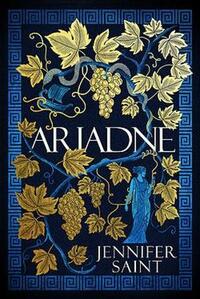Take a photo of a barcode or cover
- listening to mitski at the end of this book was not a great idea
- greek mythology is really just a study of tragedy
- basically men ain’t shit
- reminds me of how important women really are to mythology, history, and the world itself; a woman can change a man irreprehensibly (and i say a man because men are the ones who need to be changed in ideology most of the time)
- a cautionary tale for those who trust and forgive too easily
- phaedra :( hippolytus :((
- greek mythology is really just a study of tragedy
- basically men ain’t shit
- reminds me of how important women really are to mythology, history, and the world itself; a woman can change a man irreprehensibly (and i say a man because men are the ones who need to be changed in ideology most of the time)
- a cautionary tale for those who trust and forgive too easily
- phaedra :( hippolytus :((
reflective
medium-paced
Plot or Character Driven:
A mix
Strong character development:
Complicated
adventurous
emotional
hopeful
informative
inspiring
reflective
medium-paced
Plot or Character Driven:
A mix
Strong character development:
Complicated
Loveable characters:
Complicated
Diverse cast of characters:
Yes
Flaws of characters a main focus:
Yes
Characters: 4⭐️
Setting: 4⭐️
Plot: 4⭐️
Themes: 4⭐️
Personal enjoyment: 5⭐️
Emotional Impact: 3⭐️
Overall rating: 4/5⭐️
Ariadne the princess of Crete and sister to the feared Minotaur. As Theseus, Prince of Athens, intends to slay the beast he must charm his way into Ariadne’s heart.
Captivating and inspiring. A story of heroism and sisterhood.
Greek retelling from the feminine perspective.
“I had thought he brought salvation with him. Instead he traded my existing bondage for another.”
“No longer was my world one of brave heroes; I was learning all too swiftly the women’s pain that throbbed unspoken through the tales of their feats.”
A story of womanhood, loss, patriarchy, violence, peace, glory, and so much more. Read this after finishing Circe and enjoyed it just as much. Very vivid descriptions and dynamic characters. Loved how both narrators’ chapters came together.
-1 star because the story of how medusa turned into a gorgon by 'Athena' is actually the roman myth. In the greek myth she was born as one of three gorgons.
adventurous
challenging
dark
mysterious
sad
medium-paced
Plot or Character Driven:
A mix
Strong character development:
Complicated
Loveable characters:
Yes
Diverse cast of characters:
Yes
Flaws of characters a main focus:
Yes
This book makes a beautiful statement on the inherent misogyny and victimization of women throughout ancient greek mythology and culture. It's enthralling, poetically written, and heart wrenching, but readers with unrealistic expectations will be (rightfully) disappointed.
Many approach the story (hearing that it's a feminist retelling) and automatically expect the characters and premise to change. In reality, Jennifer Saint stays true to the myth and, instead, powerfully highlights the numerous offenses and inequalities placed on women. The point of the novel is that women should be afforded equal importance, agency, and choice. The author expertly shapes salient scenes of Ariadne's story to demonstrate this inequity and how men's unjustified whims often victimize women. Ariadne can choose to be a mother and live a peaceful life, just as her sister can choose to be a powerful queen. Basically, the novel uses a beloved myth to emphasize the inequities and the importance of letting women have agency-however they decide to use it.
There are many variations of the Ariadne/Theseus/Dionysus myth, which the author spins into a congruous story. The ending, however heartbreaking it may be, only serves to further illustrate her point. When unreasonably empowered, people transform to the worst, most selfish, and arrogant versions of themselves. In this case, the empowerment of men and gods alike victimize women and the innocent. Yes, it'd be lovely for the ending to be sweet and satisfying, but the entire novel's message would be lost. All in all, Ariadne by Jennifer Saint was a lyrical and meaningful retelling with a powerful message (if you care to accept it).
Many approach the story (hearing that it's a feminist retelling) and automatically expect the characters and premise to change. In reality, Jennifer Saint stays true to the myth and, instead, powerfully highlights the numerous offenses and inequalities placed on women. The point of the novel is that women should be afforded equal importance, agency, and choice. The author expertly shapes salient scenes of Ariadne's story to demonstrate this inequity and how men's unjustified whims often victimize women. Ariadne can choose to be a mother and live a peaceful life, just as her sister can choose to be a powerful queen. Basically, the novel uses a beloved myth to emphasize the inequities and the importance of letting women have agency-however they decide to use it.
There are many variations of the Ariadne/Theseus/Dionysus myth, which the author spins into a congruous story. The ending, however heartbreaking it may be, only serves to further illustrate her point. When unreasonably empowered, people transform to the worst, most selfish, and arrogant versions of themselves. In this case, the empowerment of men and gods alike victimize women and the innocent. Yes, it'd be lovely for the ending to be sweet and satisfying, but the entire novel's message would be lost. All in all, Ariadne by Jennifer Saint was a lyrical and meaningful retelling with a powerful message (if you care to accept it).
It was very well-written, but the romance at the beginning felt unearned, and therefor the surrounding emotion felt forced and dramatic. And the ending felt like a build-up of character development spoiled in an instant: finally our character finds her voice, only to have it snuffed out before she can use it. A frustrating and unsatisfying end to a story that was otherwise wonderful and epic.
I am a sucker for Greek mythology and tales of complex women from that time, so I picked this up immediately following Circe and Clytemnestra.
I would give this book 3.5 stars, rounded down to 3. The first half of this book really drew me in, and I enjoyed the pacing of a teenage girl trying to make sense and dignity of chaos and despair. I feel that (spoiler alert) once Ariadne winds up on Naxos and grew up, some of the passion for the story was lost and the pacing became uneven. At times, I found myself struggling to give the book my full attention in the latter half, as the characters fell into less sentient beings and the writing style flowed down a less vibrant path.
I still loved the story and am glad to have read it, as I learned more about Ariadne and Phaedra than I knew before. However, I do wish the book had kept its heart and pacing all the way through, and that Ariadne hadn’t become so lackluster over time. Also would have loved more of Phaedra’s story if she was going to be given her own voice — it felt she was introduced then rushed away.
All in all, I appreciate this author’s work at telling these women’s mythical stories (with real feelings behind them) and look forward to trying her writing again.
I would give this book 3.5 stars, rounded down to 3. The first half of this book really drew me in, and I enjoyed the pacing of a teenage girl trying to make sense and dignity of chaos and despair. I feel that (spoiler alert) once Ariadne winds up on Naxos and grew up, some of the passion for the story was lost and the pacing became uneven. At times, I found myself struggling to give the book my full attention in the latter half, as the characters fell into less sentient beings and the writing style flowed down a less vibrant path.
I still loved the story and am glad to have read it, as I learned more about Ariadne and Phaedra than I knew before. However, I do wish the book had kept its heart and pacing all the way through, and that Ariadne hadn’t become so lackluster over time. Also would have loved more of Phaedra’s story if she was going to be given her own voice — it felt she was introduced then rushed away.
All in all, I appreciate this author’s work at telling these women’s mythical stories (with real feelings behind them) and look forward to trying her writing again.
dark
emotional
reflective
sad
tense
medium-paced
Plot or Character Driven:
Character
Strong character development:
Complicated
Loveable characters:
Complicated
Diverse cast of characters:
No
Flaws of characters a main focus:
Yes
Basically all men are the same and the female characters were blinded by love till it was too late






